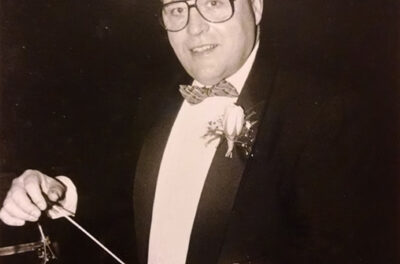Summerfest’s Artistic Director was on the podium for the season’s third concert in Cary’s Regency Park, presented before a substantial and – again – exceedingly quiet audience on the comfortable evening of June 18. There were no stars aside from the orchestra’s stellar principals (or acting principals) – even the skies were overcast – and there was no TV, closed-circuit or otherwise (although NBC17 – WNCN – was handing out fans). The sound at Summerfest is often as variable as the weather hereabouts, but on this occasion the settings were as good as this listener can recall, ever, at one of these events. Unlike two weeks ago, the top wasn’t brash, the bottom wasn’t boomy, and the mid-range was solid and constantly “present.” It was a good night, then, for a first-rate program, hosted and directed by one of our state’s great artistic treasures, the inimitable William Henry Curry, who (when not wearing his Summerfest hat) is the NC Symphony’s Resident Conductor. His fingerprints are all over Summerfest, and that’s good, for he’s one of our region’s better programmers, and this concert was no exception. It was called “Shall We Dance?,” and it encompassed music for movin’ ’round by Germans (one of whom was an English resident), Poles, Russians, Frenchmen, and an American (who happened, also, to have been a 20th-century master).
Things got underway with a dance from Handel’s Royal Fireworks Music that made one wish the NCS had a barge, like the National SO did, years ago, which was docked at a curve on the Washington side of the Potomac at a place named Watergate, in Rock Creek Park. A barge with the orchestra on it, floating in Regency Lake (if that’s its name) would be nice – especially if the critics had control of the bilge plugs and could pull ’em when the performances head south… – which they didn’t do this time. The Handel was grandly played and is a superb example of expansive music at its best.
Alas, one can’t say that about Meyerbeer’s “Les Patineurs,” from Le Prophète, a piece that was once a staple of pops concerts (when such things were concerts of popular classics, as opposed to pop artists with orchestral backing). It would probably do better with the stage action that the Maestro described, not too favorably, in excerpts from a derogatory note by Berlioz, who was not only a more brilliant and inspired composer but also – are you ready for this? – a distinguished writer and critic! There were some minor ensemble problems, doubtless reflecting the scanty preparation time available for these concerts, the many fill-ins, and the fact that the music is not played very often anymore. The leadership was fine and the overall effect was pleasing enough, but I thought the piece would never end.
Surprise! It did, and the next work – the Polka and Fugue from Weinberger’s Schwanda, the Bagpiper – was at once a heartwarming and brilliant rediscovery. The opera itself – the title of which is even more amusing in German (and you don’t have to know German to get the joke – it’s Schwanda, der Dudelsackpfeifer) – is virtually unknown now, but this orchestral bit is a true tour de force, and the NCS gave it its collective all. The musicians did the same, too, in two cuts from Tchaikovsky’s Nutcracker, a work most of them can surely play in their sleep – but there wasn’t any snoozing this time, for the excerpts were marvelously inflected and surged with energy and verve.
Part two began with the lively Czardas from Delibes’ Coppelia and then progressed to one of the great little tone-poems by Saint-Saëns, “Danse macabre, which featured Acting Concertmaster Rebekah Binford in several handsomely-realized solo bits. (The other artist who stood out during this concert – consistently and consistently favorably – was Principal Harp Anita Burroughs-Price.) Curry is – as someone once said of versatile dog-show judges – a great all-’rounder, in terms of his musical interests and abilities, so even though the NCS played almost no French music – and played not too well what little French music it did undertake – during the long tenure of the previous Music Director, Curry and the orchestra delivered these Gallic scores with charm and enthusiasm.
Excerpts from Copland’s great American ballets – Billy the Kid, Appalachian Spring, and Rodeo – formed a very attractive three-movement suite that was structurally akin to an Italian overture, fast-slow-fast in form. But the icing on the cake was the grand finale, the “Polovtsian Dances” from Borodin’s Prince Igor. Never mind that the choral parts were omitted – although it would surely have been possible to get the Town of Cary’s excellent choir, the Concert Singers of Cary, to provide those marvelous lines. This – with the ever popular theme of “Stranger in Paradise” (from Kismet, from Prince Igor…) as the main tune – was a reading that one would have been delighted to hear in any major opera house, and it brought down the house, figuratively speaking. Indeed, the response was so good that the band played an encore – rare in its home venue but common enough in Cary – the lively “Can-Can” by Offenbach, which kept some of the people on their feet for the duration.
In sum, ’twas a superb evening with the NCS in its lovely summer home. The series continues on 6/25 with Pink Martini. For details, click here.











